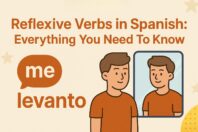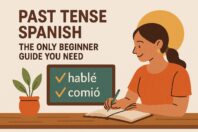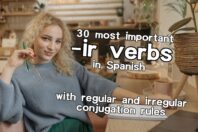To Become In Spanish: 5 Different Ways To Say It

Get our free email course, Shortcut to Conversational.
Have conversations faster, understand people when they speak fast, and other tested tips to learn faster.
More infoDepending on what you want to say, there are 5 different ways that native speakers express “to become” in Spanish.
In this post, we’ll cover each way to express this, depending on the specific context you are using it in.
So, without further ado, let’s begin.
1) Volverse
This first verb is used when somebody or something becomes (or turns into) something different.
It is pretty flexible, as it can refer to a transition that was sudden or gradual, physical or mental.
Normally, the use of volverse will be followed by a noun or adjective.
Let’s see examples:
- After losing her parents, Karen became a lonely person – Después de la pérdida de sus padres, Karen se volvió una persona solitaria
- If they lost the last game, they would instantly become crazy – Si ellos perdiesen el último juego, se volverían locos en el acto
- He used to be a bitter person, but now he has become a very and very positive guy – Él solía ser una persona resentida, pero se ha vuelto un tipo muy amigable y positivo ahora
- I became lazy over time, and I stopped writing new books – Con el tiempo me volví flojo y dejé de escribir libros nuevos
2) Convertirse en, transformarse en
These two verbs have similar meanings.
While transformarse is less common, both verbs typically indicate a feeling of evolution, or a major, dramatic change that can be either physical or mental.
- After a few days, the clumsy caterpillar became a beautiful butterfly – Pocos días después, la torpe oruga se transformó en una hermosa mariposa
- We become what we think – Nos convertimos en lo que pensamos
- The last time she saw her son, he was just a kid. Now, after all these years, he has become a man finally – La última vez que vió a su hijo era tan solo un niño, ahora después de todos estos años, se ha convertido finalmente en un hombre
- Milk can be transformed into cheese, but not viceversa – La leche se puede transformar en queso pero no al contrario
3) Hacerse
This verb refers to deliberate or voluntary changes in identity or affiliation.
It’s commonly used to highlight the moment you acquire an essential (ser-like) characteristic and is helpful when talking about professions, religions, ideology, and money.
- They got a ridiculous sum of money by selling that dating app, they’ve become rich! – Ellos obtuvieron una absurda suma de dinero vendiendo esa aplicación para citas, ¡se han hecho ricos!
- Michael quit his job to become a student at seminary – Michael renunció a su empleo para hacerse un estudiante de un seminario conciliar
- How can we become members of the chess club? – ¿Cómo podemos hacernos miembros del club de ajedrez?
This verb also tends to be used as a fixed expression.
Hacerse adulto: to become an adult
- Carlos has become an adult already – Carlos se ha hecho todo un adulto ya
Hacerse amigos: to become friends
- Raul and Samuel became friends when they were in elementary school – Raúl y Samuel se hicieron amigos cuando estaban en la escuela primaria
Hacerse famoso: to become famous
- Daniel Radcliffe became famous after playing Harry Potter – Daniel Radcliffe se hizo famoso luego de interpretar a Harry Potter
Hacerse obvio: to become obvious
- After a while in the government, his intentions became obvious – Luego de un tiempo en el gobierno, se hicieron obvias sus intenciones
Hacerse viejo: To get old
- Alejandra’s dad is getting old very fast – El papá de Alejandra se está haciendo viejo muy rápido
4) Ponerse
Ponerse expresses a physical, mental, or healthy change, which is sudden or temporary.
As you’ll see, it can be used with words to describe a mood, or a state, which perhaps is caused by someone else.
Emotional States
- Ponerse…
- Triste
- Alegre
- Agresivo/a
- Emocional
- Sentimental
Physical States
- Ponerse
- Rojo/a
- Blanco/a
- Amarillo/a
- Flaco/a
- Gordo/a
- Enfermo/a
- Andreina blushes when her boyfriend calls her “sweetie” – Andreina se pone roja cuando su novio le dice “cariñito”
- The kids became sick yesterday and they couldn’t go to school – Ayer los niños se pusieron enfermos y no pudieron ir al colegio
- I become sad every time I watch that show on TV, it is very moving – Me pongo triste cada vez que veo ese programa en la televisión, es muy conmovedor
- The girls got really thin because they went on diet – Las chicas se pusieron muy flacas porque estaban a dieta
Just like the previous example, this verb also works for certain expressions.
Ponerse caro: to become expensive
- Gasoline became very expensive after the last national adjustment – La gasolina se puso muy cara luego del último ajuste nacional
Ponerse de moda: to become fashionable / to be in
- Some years ago, slim jeans became fashionable for men and women – Hace algunos años los jeans slim se pusieron de moda para hombres y mujeres
5) Llegar a ser
And finally, this structure implies that somebody has worked to become something different.
In other words, it didn’t just happen.
Normally, the change required a significant effort to become something or reach a goal.
- Isabel became the most famous doctor in Bogotá after working hard in a rural hospital – Isabel llegó a ser la doctora más famosa de Bogotá después de trabajar muy duro en un hospital rural
- If you study enough Spanish on a daily basis, you will become an outstanding speaker of the language – Si estudias diariamente, llegarás a ser un hablante del idioma excepcional
- What does it take to become the president of the company? – ¿Qué se necesita para llegar a ser el presidente de la compañía?
- Gabriel García Márquez became one of the greatest symbol of Latin American literature – Gabriel García Márquez llegó a ser uno de los más grandes emblemas de la literatura latinoamericana
Now that you know several ways to express “to become in Spanish”, it’s time to test yourself with some exercises on what we covered in this post.
To Become In Spanish: Exercises
Complete the blanks in each sentence with the correct conjugation of each verb
- ____ (yo – ponerse) enfermo el año pasado en Caracas
- Julia ____ (volverse) loca cada vez que escucha a sus hijos gritando en la casa
- Su papá ____ (hacerse – presente continuo) viejo. Siempre olvida las cosas
- Leonardo y su hermano ____ (llegar a ser – futuro simple) grandes futbolistas de la Liga Española
- ¿Por qué ____ (tú – ponerse) tan triste cuando escuchas esa canción, Maritza?
- Los cachorritos ______ (convertirse – pretérito ) en perros adulto muy rápido
- Después de tantas peleas, Verónica y Ana ____ (hacerse – pretérito) grandes amigas
- El agua al llegar a 100° de temperatura ____ (transformarse) en vapor
- Mark Zuckerberg ____ (hacerse – presente perfecto) muy famoso por ser uno de los creadores y fundadores de Facebook
- Cristina ____ (ponerse) muy enojada cuando su prima usa sus cosméticos
To Become In Spanish: Answers
Let’s see how you did in the above exercises.
- Me puse muy enfermo el año pasado en Venezuela
- Julia se vuelve loca cada vez que escucha a sus hijos gritando en la casa
- Su papá se está haciendo viejo. Siempre olvida las cosas que le preguntan
- Leonardo y su hermano llegarán a ser los futbolistas más destacados de la Liga Española
- ¿Por qué te pones tan triste cuando escuchas esa canción, Maritza?
- Los cachorritos se convirtieron en perros adultos muy rápido
- Después de tantas peleas, Verónica y Ana se hicieron grandes amigas
- El agua, al llegar a los 100°, se transforma en vapor
- Mark Zuckerberg se ha hecho muy famoso por ser uno de los creadores y fundadores de Facebook
- Cristina se pone muy enojada cuando su prima usa sus cosméticos



